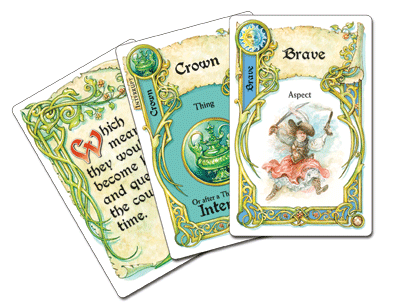 Some of the cards from Once Upon a Time (Atlas Games) Some of the cards from Once Upon a Time (Atlas Games) The high school that I teach at doesn't have the best reputation. We have low test scores and a grade of D from the state. Even though we have some award-winning teachers whose students do magnificent things, it feels like nobody every talks about the good stuff. But if you were to visit my classroom, you would immediately notice that my students are intelligent and charming. They can be rowdy, but don't let that fool you. The trick—and I still struggle with this every day—is to be engaging enough to draw their attention away from the drama of being teenagers. Unfortunately, few of my lessons are that good, because I am old and boring (I'm turning 30 in June, and to a teenager, that is ancient). My school's game club, however, always fills me with hope. One of our biggest issues school-wide is that many of our students are weak readers. Very few of my students read for pleasure, and most see reading and writing as agonizing punishments. I make my College Prep kids write a practice SAT essay every week, and they still grumble about it as though I am trying to tear off their fingernails. Despite all of the reading/writing hate, two of our biggest hits at Game Club are Once Upon A Time and Gloom. That's right. Many of my students claim to hate books, but they LOVE storytelling games! Once Upon a Time is a game in which the players tell a story together. Every player will have a starting hand of cards that contain various story elements, as well as one card with a secret individual ending. While you are narrating, you play your cards by incorporating them into the tale. If someone else is narrating and says a word that is printed on your card, you can interrupt and take over as storyteller. The ultimate goal is to play all of your cards and guide the tale towards your secret ending. In our most recent round of OUaT, we slowly revealed the saga of a fairy who lived in a well, went too deep, and ended up reaching a sewer that contained the lost city of Pooplantis. (This is what happens when you play with teenage boys, and I wouldn't have it any other way.) The absolute joy my students take in asking leading questions, in trying to interrupt each other, and in making each other laugh is priceless. Even students who are normally a bit shy about playing games enjoy OUaT, because although there is a win condition, there isn't much competitive pressure. The game truly is about having a good time telling a story together. 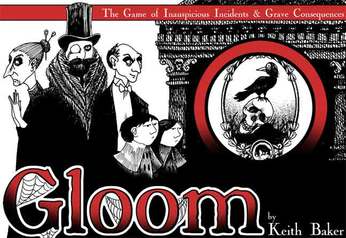 Gloom (Atlas Games) Gloom (Atlas Games) Gloom is also a particular favorite with my students, especially the ones who like to feel a little bit wicked. The object of Gloom is to take control of a family—possible members include a creepy clown, evil twins, and a "disturbing handyman"—and play status cards that make your family as miserable as possible before they die horrible deaths. You can also annoy your fellow players by making their families happy and successful. As you play the cards, you read the flavor text and tell a story about what happened. Over the course of a game, you and your friends create a communal tale of despair, and it is hilarious. What I love about Gloom is that my students know the text on the cards is going to be slightly transgressive. As a result, they will devour it, even if it contains words they aren't fully familiar with. The desire for new information drives them to take joy in reading. And both Gloom and OUaT help my students to connect with words and to pay attention to something other than a smartphone screen. When I see these things happen, I wonder: Would it be possible to extend an experience like this to a full classroom of kids? What concepts could I take from games to help my students focus and actually retain some material? I haven't fully figured out the answer yet, but I do know this: My students respond so much better to play than they do to our current system of standardized testing and endless preparation for it. They are quicker to learn strategy when engaged with a game, even if it's complicated, because they are motivated. And once I have played a game with a student, our relationship changes for the better. I think it's because we've actually had fun together and connected as people. Shouldn't school be that way more of the time, and not just on Game Club afternoons? P.S. If you would like to see footage of Once Upon a Time and Gloom in action, they have both been featured on Wil Wheaton's Tabletop. Just click the links to be taken to YouTube.
0 Comments
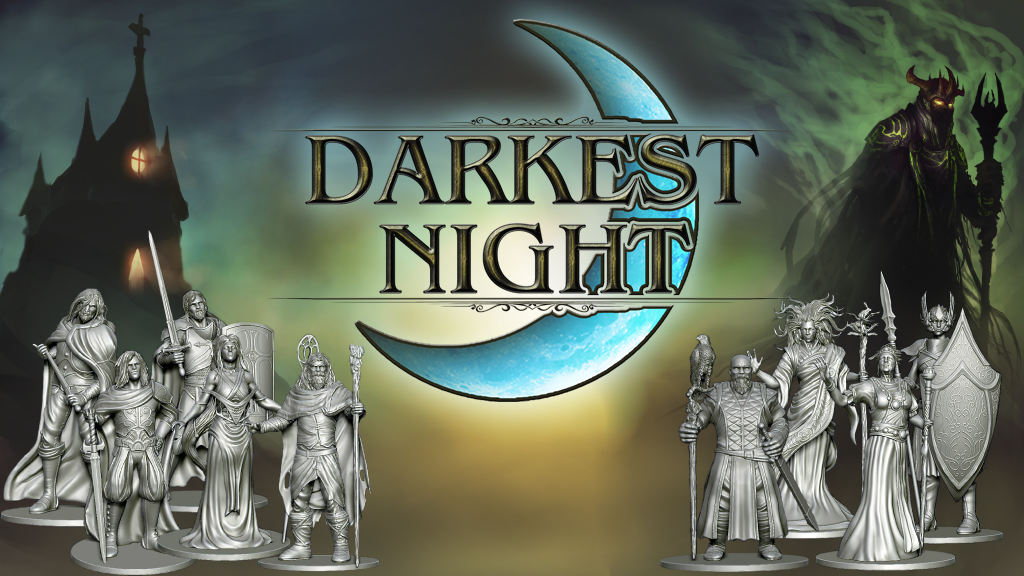 Although I enjoy several board games that began as Kickstarter projects (Apex Theropod, Hostage Negotiator, etc.), I have never actually backed a game on Kickstarter. But Darkest Night has been on my wish list for a while. When I heard that a second edition would be on the way soon, I held off on buying the first edition and waited for the Kickstarter campaign to start. I have long been suspicious of Kickstarter, in part because my boyfriend has been waiting for Mighty No. 9 for several years now. But Victory Point Games has successfully run campaigns before, and Dawn of the Zeds 3rd ed. ought to be reaching its backers in the near future. I expected the Darkest Night campaign to... well... to have its shit together from day one. Darkest Night is already an established game with a faithful following. How could this possibly go wrong? On Tuesday afternoon, I backed Darkest Night. I was looking forward to that day in March 2017 when I could rescue a blighted world from the hands of an evil necromancer. Other people seemed excited, too, based on the fact that the project was already half-funded by the time I went to bed that night. Alas, about 24 hours later, I received an email notifying me that the campaign had been canceled. Wait... what? Apparently, funding for the project had slowed down, and Victory Point Games had received many complaints from would-be backers. So many, in fact, that they had decided to scrap the Kickstarter campaign entirely and restart it next week. Based on the threads from BGG and on comments from the Kickstarter page, potential backers of the game were upset about three main things: 1) Pricing. The game itself (especially with the expansions) was a bit expensive. I expected that, honestly. But some of the shipping costs, especially to gamers in Europe, were absurdly high. 2) Miniatures vs. Standees. I did not realize that people were so passionate about this issue. Darkest Night was going to be released with pretty sweet-looking miniatures, but several would-be buyers argued that they would prefer standees. Some believe standees would be cheaper, while others just feel minis are overly trendy right now. 3) Awkward stretch goals. Many of the stretch goals for the Kickstarter campaign entirely focused on people who backed the game with both expansions (not those who only went in for the base game or for the base game plus one expansion). They also exacerbated the minis vs. standees problem. The heroes included in the expansions would not have miniatures unless the stretch goals were met, which means that rather than have a consistent game with all miniatures or all standees, players could be stuck with an ungainly mix of the two. Victory Point Games clearly expected this project to be funded quickly, perhaps even within the first 24 hours. (I wonder if the Dark Souls board game has created some high expectations.) The fact that Darkest Night slowed down by day two seems to have sent VPG into a tailspin. I have very mixed feelings about this entire situation. It seems crazy to get $70,000 into a campaign and then scrap it. Could VPG have tweaked the existing campaign? More importantly, why didn't they think this out more thoroughly in the first place? Did they trust in Darkest Night's reputation and get lazy about making the campaign as excellent as possible? I'm glad they are listening to their consumers, but the fact that it had to happen in such dramatic fashion is a turnoff. I also worry that a botched start has destroyed momentum and prevented us from playing the best possible version of Darkest Night. Will buyers truly respect VPG's decision to restart and open their wallets next week when the campaign goes live again? Or did VPG overreact to the complaints of consumers who ultimately cannot be satisfied? Hopefully, the campaign will come back better than ever, and we will all get to experience the premium version of Darkest Night. But there is nothing premium about a sloppy start. Although the renewed campaign may override my doubts, my first attempt at backing a game on Kickstarter has been less than impressive.  Since childhood, I have been mildly obsessed with Sherlock Holmes. I devoured the original Conan Doyle stories, and I've watched and rewatched Jeremy Brett's iconic performances as Holmes. When I heard about a game called Sherlock Holmes: Consulting Detective, I had to have it. Consulting Detective is not like most games. There is no game board, and there are no pieces to move or dice to roll. You have only a map, a directory, some copies of the Times, a case book, and your wits. Not only am I attracted to the prospect of a game that is all skill and no luck, but Consulting Detective also offers a relaxing hybrid of reading a book and playing a game. The introductory text and the statements and observations you can find in the casebook are very well written and highly atmospheric. Even random tidbits in the newspapers (I particularly enjoy the personal ads) add fun and flavor to the game. It is escapism at its finest. The premise of the game is that you are a Baker Street Irregular, and that Holmes is teaching you the detective's trade by having you cut your teeth on cases he has already solved. It is fun to imagine that your deductive skills are being honed by history's greatest detective, and even more fun to entertain fantasies of someday beating the master at his own game. Consulting Detective actually does encourage you to "beat" Holmes through ruthless efficiency—you can "win" if you solve the case using fewer leads than he does. I do not, however, recommend this method of playing the game. If you rush through the cases, you will inevitably miss a lot of the richness and joy that Consulting Detective can offer. In addition to finding information about the "main" case, you will run across sometimes hilarious side stories that lighten up the game and deepen the experience of playing it. Also, what is the point of all of those painstakingly written casebooks if nobody reads them? Seriously, if you get this game, take the time to really savor it. Don't rush through in an attempt to "win," because it will ultimately be less satisfying. 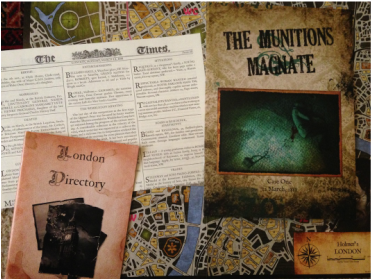 The game is afoot! The game is afoot! There is one other very good reason to slow down when playing Consulting Detective, and that is the limited nature of a mystery game. There are only ten cases in the box, and you are eventually going to run out of them. Board Game Geek features some fan-made cases, and an expansion in English should be published soon, but ultimately, this game is finite. Don't waste it. The materials in the box are also finite—you get one map, one directory, one copy of each newspaper, etc. To maximize the fun of playing Consulting Detective, I recommend that you either play it alone or with a very small group of people. It might drag if too many people are trying to follow leads, read things for themselves, etc. I also have one major caveat. Although I adore this game and plan to finish playing every single case, Consulting Detective is not perfect. When it was first published in 1981, its original language was English. But the current reprint is actually re-translated from French. Some of the cases, especially Case 3, are affected by sloppy translations that lead to contradictory evidence and flubbed details. The game is not broken, and it's still fun to play, but if you get the game and notice something weird, you should check the unofficial errata at Board Game Geek for spoiler-free corrections. Overall, I highly recommend Consulting Detective and will be on the lookout for any expansions. I think my heart is going to break just a little bit when I finish the tenth and final case. This is an excellent gaming experience, particularly for soloists. 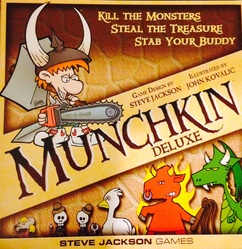 Bane of my game night! Bane of my game night! When I dislike something that I don't have to do for work or medical reasons, I am usually able to avoid it. Unfortunately, this has not been the case with Steve Jackson's Munchkin. Munchkin in its original form is a game meant to poke fun at traditional pen-and-paper RPGs. It is also supposed to provide a gaming experience that allows players to battle monsters and loot their lifeless corpses for treasure without having to do any of that character building and role playing stuff. Since its publication in 2001, Munchkin has appeared in several different forms, and you can now play zombie, Cthulu, Marvel, and several other versions of the game. 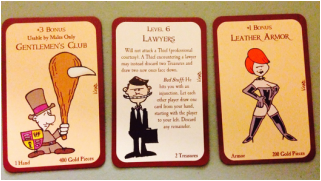 These were funny the first 1.5 times. These were funny the first 1.5 times. The object of Munchkin is to be the first player to reach level 10. Players may trade items, help each other out, or actively hinder each other in the race to the top. Typically what this means is that the game will drag when players begin to reach higher levels, because whoever is in the lead will be brought down by everybody else. This process is repeated until no one has any good cards left. Finally, someone will slip across the finish line unopposed, and the game is over. The first time I played Munchkin, it was relatively amusing—I was hanging out with friends, and the jokes on the cards were pretty funny. By the third time I played Munchkin, the jokes had gotten old, and the game had become excruciating. Even when I tried the Marvel version of Munchkin, I was quickly bored by the "new" cards and spent a lot of time waiting for someone to get to level 10 already so we could play something else. Despite my personal feelings, Munchkin is a game that will probably haunt me forever. This is because new gamers, especially my students, love it. LOVE IT. For teenage boys, the Leather Armor and Pukachu cards never seem to get old. And for people who are playing a non-traditional board game for the first time, Munchkin is accessible and undemanding. The jokes keep the game light, and the lack of deep strategy gives everyone a reasonable shot at victory. Because it is possible to team up with other players, a newbie who has drawn a bad hand can still receive help and useful items to make the experience more enjoyable. Unfortunately, when you are becoming acclimatized to tabletop gaming, it's also common to want to play safe and familiar games repeatedly before you are ready to move onto something else. This is where Munchkin becomes the bane of my existence. The occasional round of it is tolerable when it's been a while and when I'm with new players who will experience the jokes for the first time. It is decidedly intolerable when I get stuck playing it at game club for the third week in a row. All the same, I will continue to grit my teeth and be a good sport whenever Munchkin comes to the table. Gaming with a group means playing what the larger group wants to play, and I'm not going to rain on someone else's parade. I worry that hating on Munchkin and pushing other games too aggressively will drive enthusiastic neophytes away from the hobby. New players need to go at their own pace, and will move on if and when they are ready. Besides, if Munchkin is what eventually leads my friends and students down that slippery slope that ends in a multi-hour game of Eldritch Horror, I will consider my investment worthwhile. Until then, I am happy to game by myself! |
AuthorMy name is Liz Davidson, and I play solo board games. A lot of solo board games... Archives
August 2021
Categories
All
|
 RSS Feed
RSS Feed